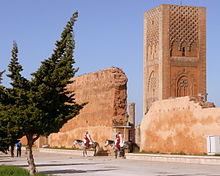Abū Yūsuf Yaʿqūb al-Mansūr
Abū Yūsuf Yaʿqūb ibn Yūsuf al-Mansūr ( Arabic أبو يوسف يعقوب بن يوسف المنصور, DMG Abū Yūsuf Yaʿqūb ibn Yūsuf al-Manṣūr ; * around 1160; † 1199 ) was Caliph of the Almohad in the years 1184-1199.
Life
Yaqub al-Mansur was appointed vizier under the government of his father Abu Yaqub Yusuf I (r. 1163–1184) and resided in Seville . After the death of his father, he was able to enforce his rule with the help of the clan of Abu Hafs Umar and put down revolts of his brothers and his uncle. In Andalusia , the Almohads continued to operate successfully against the Christians. So Yaqub al-Mansur achieved a great victory over the Kingdom of Castile at Alarcos on July 19, 1195 . In 1197 there was an advance as far as Madrid and Guadalajara . This stopped the expansion of the Christians to the south for a few years.
Yaqub al-Mansur was less successful than in Andalusia in defending the empire in Ifrīqiya and Tripolitania , where there was renewed fighting with the Ayyubid mercenary leader Qaraqush. But the uprising of the Banu Ghaniya in Ifriqiya was more disastrous . Members of this tribe were appointed by the Almoravids as governors in the Balearic Islands , as they did not recognize the rule of the Almohads. In 1184 they landed under Ali, coming from the Balearic Islands, with an army in Bougie and allied themselves with the Bedouins of the Banu Hilal in Ifriqiya. Although they were beaten several times by the Almohads, the uprising could never be finally suppressed. When Yahya took over the leadership of the insurgents in 1195 and eliminated Qaraqush, a devastating guerrilla war began which devastated Ifriqiya, Tripolitania and large parts of Algeria and led to the ruin of the economy.
Yaqub al-Mansur fell ill during a campaign in Andalusia and, before his death in January 1199, appointed Muhammad an-Nasir (r. 1199–1213) as his heir to the throne; he was buried in Tinmal .
Religion and culture
Yaʿqūb publicly confessed to the zāhirite teaching and turned away from the Malikites . Even though the philosopher Ibn Ruschd / Averroes was temporarily exiled under Yaqub al-Mansur because of heretical views, art and culture continued to be promoted. Above all, extensive construction work was carried out. In addition to the construction of the city fortress ( kasbah ) of Marrakech , the completion of the Great Mosque in Seville , which was expanded to become the residence of the Almohads in Andalusia, took place. In Morocco he turned to the expansion of the existing fortress of the Kasbah des Oudaias in Rabat and had the area expanded. The Hassan - mosque in a 3 km long rammed against it surrounded -Mauer lower city Rabat could not be completed. He is also credited with building the Mehdia fortress .
literature
- Ulrich Haarmann : History of the Arab World. Edited by Heinz Halm. 4th revised and expanded edition. CH Beck, Munich 2001, ISBN 3-406-47486-1 , (Beck's historical library) .
- Stephan Ronart, Nandy Ronart: Lexicon of the Arab World. A historical-political reference work. Artemis Verlag, Zurich et al. 1972, ISBN 3-7608-0138-2 .
Web links
- Abu-Yusuf-Yaqub-al-Mansur - Short biography (Encyclopaedia Britannica, English)
Individual evidence
- ↑ Cf. Ignaz Goldziher: Die âhiriten. Their teaching system and their history. A contribution to the history of Muslim theology. Leipzig 1884. p. 174.
| personal data | |
|---|---|
| SURNAME | Mansūr, Abū Yūsuf Yaʿqūb al- |
| ALTERNATIVE NAMES | Mansūr, Yaʿqūb al-; Mansur, Abu Yusuf Yaqub ibn Yusuf al- (full name) |
| BRIEF DESCRIPTION | Caliph of the Almohads (1184–1199) |
| DATE OF BIRTH | 12th Century |
| DATE OF DEATH | January 1199 |
